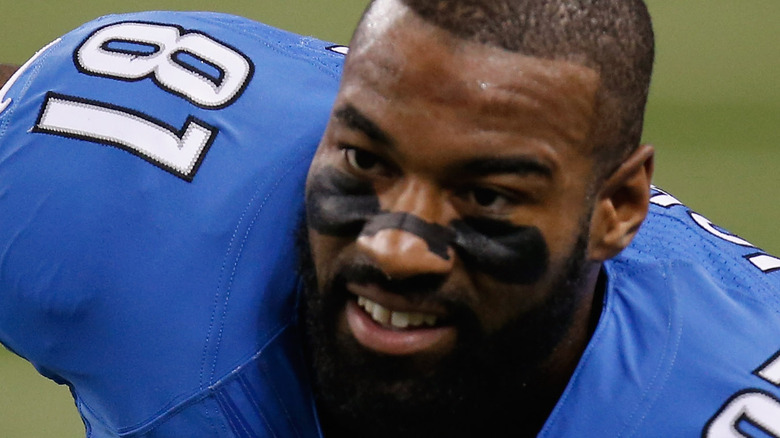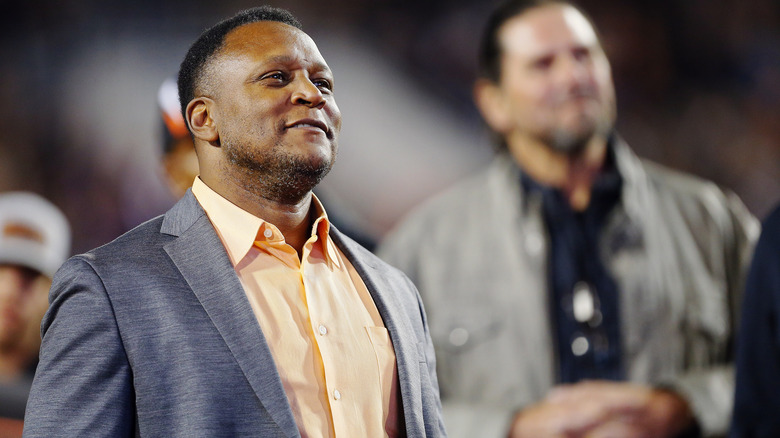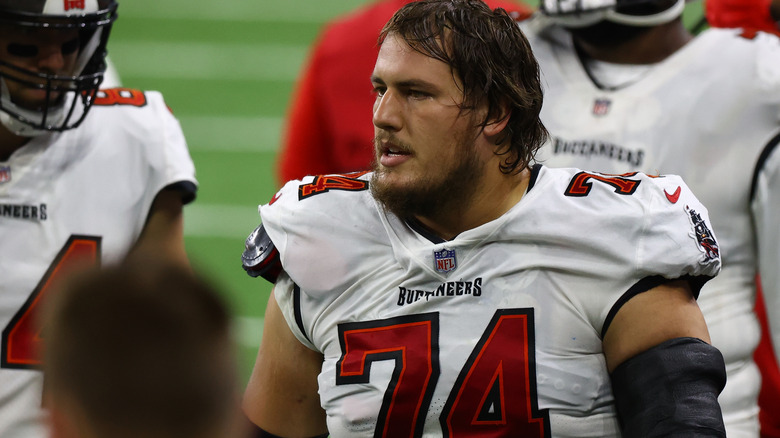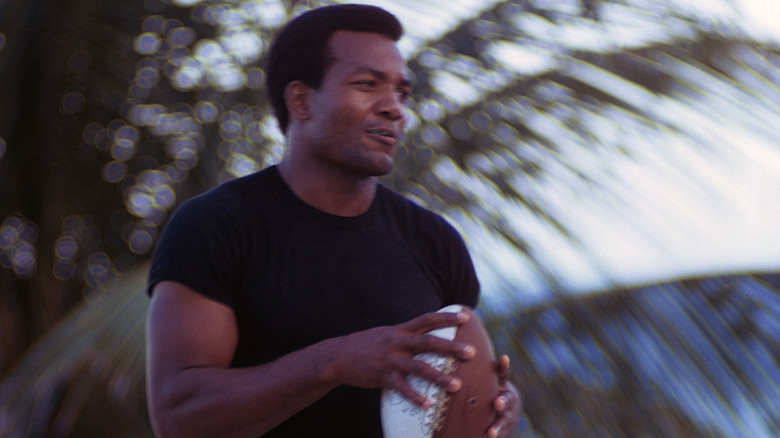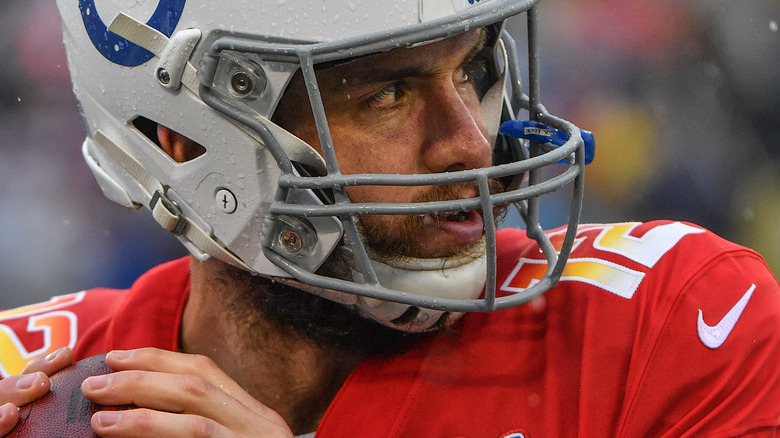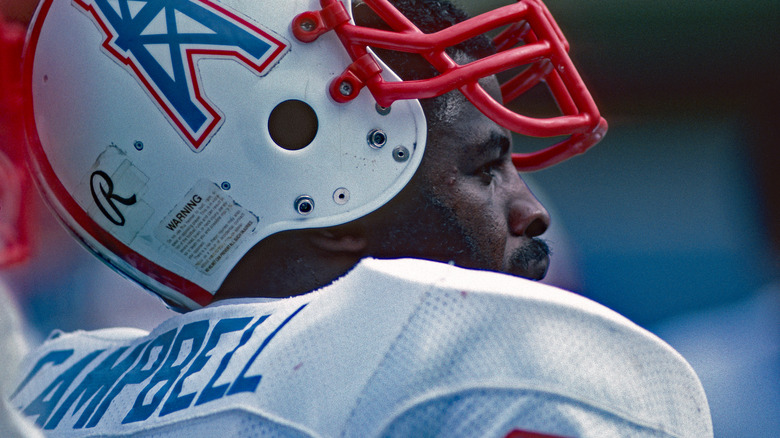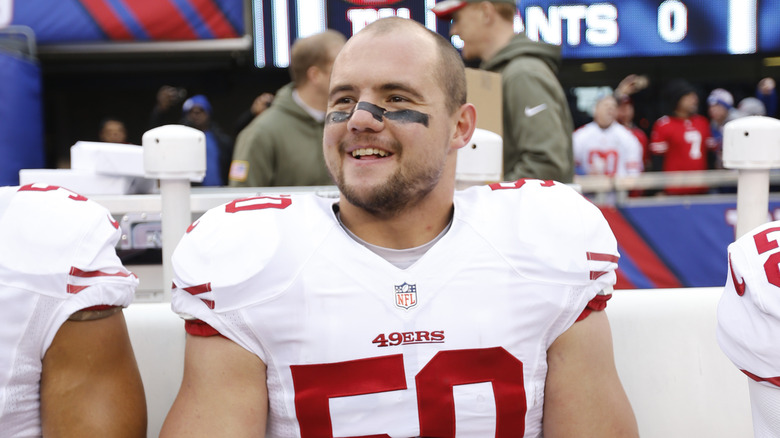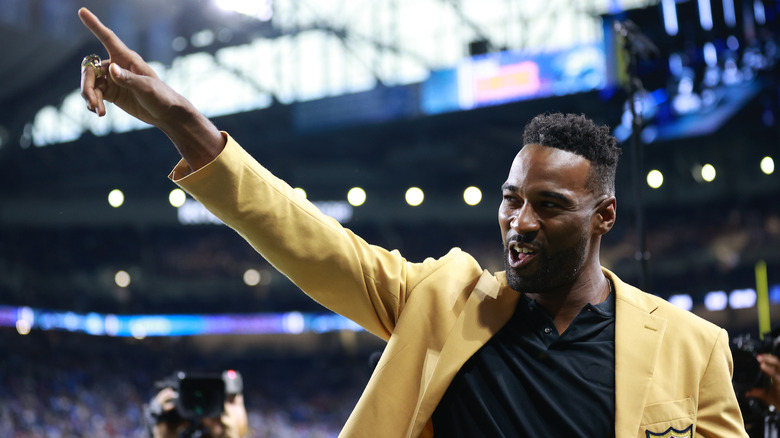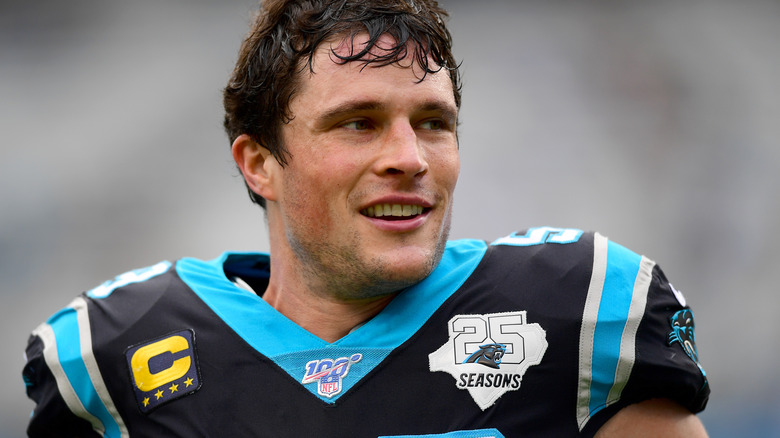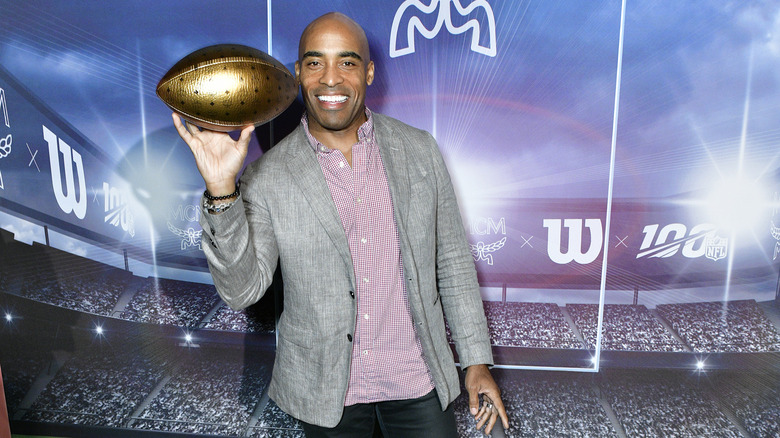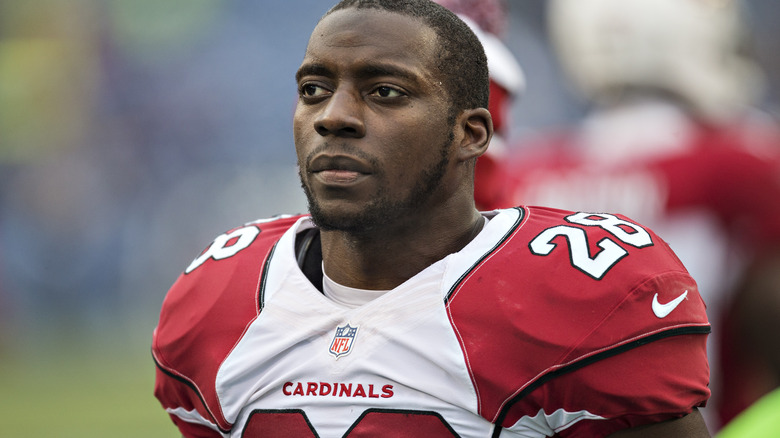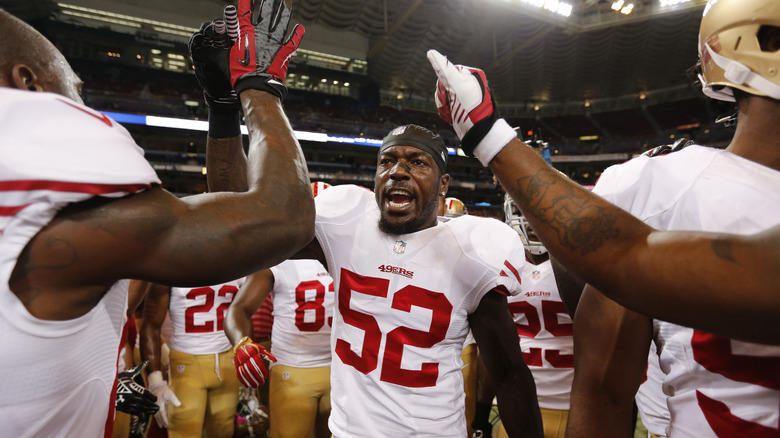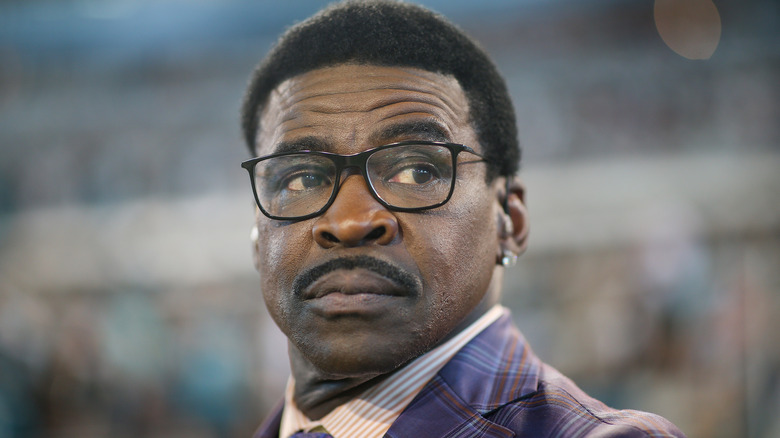NFL Players Who Retired At The Top Of Their Game
When the majority of NFL players retire, it's a natural end to their careers and there are usually some signs that the inevitable is right around the corner.
The Bleacher Report cites the case of Kyle Vanden Bosch of the Detroit Lions, who coaches wanted to sign so badly that they offered him not only a $26 million contract in 2010, but they commissioned a custom action figure of him in a full uniform. A few years later, the sport had taken a toll on him, his stats slipped, and he was released from the contract that they'd tried so hard to get him to sign.
But what about those who are sitting at the very top of their game, whether they're resting on their statistics, still celebrating a repeat Pro Bowl nomination, or maybe a Super Bowl win? Maybe they're still young, maybe they signed a contract with a team that thought they had a handful of incredible years left, and then? Retirement. It's happened to some major, big-league players who didn't wait until sliding stats, or on-the-field mistakes, started to tarnish their legacy before they decided they wanted to ride off into the wild blue yonder. That said, let's talk about some players who opted for an early retirement.
Barry Sanders
In 1999, The Washington Post announced that Detroit Lions' running back Barry Sanders had made it official: He was done with the NFL, and he was pretty straightforward about why. Sanders simply explained, "My desire to exit the game is greater than my desire to remain in it."
And it was an absolute gut-punch for fans, who weren't just from a down-and-out city, but who had sat and cheered their way through just four winning seasons in the two decades before Sanders danced his way onto the field ... and then owned it. Sanders had been transformative, he'd given Detroit something to cheer for, to be proud of, and he was just shy of 1,500 yards of setting a career rushing record. Ian Mathews explained for Forbes that he was everything Detroit needed, from becoming a rallying point for the entire team, to remaining a down-to-earth, humble, blue-collar sort of guy ... and his loss hurt.
Teammates tried to talk him out of it, fans were sure there had to be more to it, but for Sanders, it was simply time for him to move on. In 2020, he told the Los Angeles Times that he had no regrets about his decision: "I was able to leave on my own terms, so that's empowering in a lot of ways. I lived out what was beyond a childhood dream. It was enough for me, and it was time to move on."
Ali Marpet
Tampa Bay fans were shocked by the announcement that Ali Marpet was walking away from the NFL at just 28 years old. Still, Sports Illustrated said that at the time, he really didn't get into just why he was leaving what many might consider a dream job. For that, it's necessary to head over to the UK-based paper, The Guardian.
Marpet was incredibly candid in speaking about things that tend to get overlooked in the name of the game, starting with his weight. Clocking in at around 300 pounds — pretty standard (if not light) for a linebacker, he was already starting to develop weight-related conditions like hypertension and sleep apnea. He told reporters, "I was eating as clean as possible for a 300-pounder, but having all the weight on your body is bad."
The potential for head injuries was the other big factor in his decision, and in spite of the fact that he loved football and loved playing, he said he wasn't willing to risk his long-term health for it. "... one of my strongest values is health, and if I'm really going to live out what's important to me, it doesn't make sense to keep playing," he explained. And he saw playing as already courting disaster, citing three games he missed in late 2020 after suffering a concussion, and other, less acute head injuries that weren't enough to take him out of the game, but, he worried, might have catastrophic effects down the road.
Jim Brown
The NFL — and football itself — has changed a lot over the decades, but watching old footage of Jim Brown is still nothing short of magical. When The New York Times reported that he had announced his retirement in 1966, they also talked about a ton of awards, and the fact that he'd rushed the equivalent of nearly seven miles in his nine years in the NFL. Just a year prior to retiring, he had been named the league MVP, held scores of records, and in those years of suiting up for the Browns, he hadn't missed a single game. He was young, healthy, and on top of the world ... so, what happened?
Simply put, he got hit by the acting bug. According to ESPN, Brown's shock announcement came after he headed to London for a part in "The Dirty Dozen." He ultimately starred in more than 30 movies, and in addition to the complicated legacy he left behind, he's also been outspoken in the NFL's treatment of older vets.
In 2019, Brown wrote a scathing condemnation of the league for The New York Times, revealing the retirement plan for players who retired pre-1993: $365 a month per season played. That, he wrote, left many of the players — who helped shape the NFL into the multi-billion-dollar industry it is today — struggling, often in the face of medical bills mounting from conditions and injuries sustained while playing. He considered himself fortunate to have found a second career.
Andrew Luck
Quarterbacks, says The Bleacher Report, usually don't hit their stride until they're around 25 years old — making them the late bloomers of the NFL. They typically have longer careers, too, which is why Andrew Luck's retirement from football and the Indianapolis Colts at the age of 29 was such a shock. Add in the fact that the previous season he'd guided the team to the playoffs, and it seemed to come out of left field.
It wasn't until 2022 that Luck got honest with ESPN, saying there were a few things that led to him pulling the ripcord on his career — one that experts had been sure would end with his induction into the Hall of Fame.
Luck said that he cried the day after he announced his retirement, filled with regret and uncertainty. It took him a while to even start to come to terms with it, and repeatedly asked himself, "How do you fall out of love with something you loved?" Introspection — and journaling — led him to the conclusion that it had been the right decision for him: He'd hated the media attention, the fact that football had become his entire identity, and the pressure of trying to control the narrative. Add in major injuries that included a lacerated kidney, a shoulder injury, and the depression that came from missed games, and even his $139 million contract couldn't make him stay.
Earl Campbell
When Earl Campbell left the NFL after just nine seasons, the Los Angeles Times reports that he was 31 years old, had amassed just under 10,000 yards rushing, was considered a no-brainer for the Hall of Fame, and was still considered one of New Orleans's most reliable players. League-wide and all-time, he was seventh in rushing yards (via The Washington Post). At the time of his 1986 retirement, he cited a desire to spend more time with his family, but a 2017 interview with a 61-year-old Campbell suggests there may have been more to it.
Campbell — a long-beloved Houston Oilers rusher as well — said that he knew he was done one morning, when he was in so much pain that he had no choice but to crawl to the bathroom. He was getting around with the help of a walker, which wasn't entirely surprising.
His post-NFL life had included four back surgeries and two total knee replacements, which had led to other issues: Namely, alcohol abuse and an addiction to painkillers. As of 2017, USA Today reported that he had been sober for nine years, and said that the game had changed a lot since he retired. "Well, football is not played like it was when I played," he explained. "I can't play because I didn't get a pedicure this week. I can't play because my head hurt. That wouldn't have got the job done back in my day."
If you or anyone you know needs help with addiction issues, help is available. Visit the Substance Abuse and Mental Health Services Administration website or contact SAMHSA's National Helpline at 1-800-662-HELP (4357).
Chris Borland
Chris Borland wasn't just in the prime of his career, he was at the very beginning of it when he announced his retirement in 2015. He had just finished his rookie season with one of the best first-year performances in the NFL, but the 49ers linebacker decided to call it quits amid worries about the connections between repeated head trauma, concussions, and long-term, degenerative neurological diseases. According to ESPN, he explained, "I honestly want to do what's best for my health. From what I've researched and what I've experienced, I don't think it's worth the risk."
That, he added, included playing through what he believed was a concussion he suffered while still in training camp. He had been trying to secure a spot on the team and didn't say anything, but misgivings gave way to concern when he started researching the former players diagnosed with traumatic brain injuries.
Borland's decision was met with extreme reactions, reported Fox Sports: He was openly mocked by some (like former quarterback Danny Kanell), told he was overreacting by others, and laughed at for giving up a ton of money for no real reason. The 49ers, however, were gracious, saying, "We respect Chris Borland's decision and wish him all the best," adding, "He was a consummate professional from day one and a very well-respected member of our team and community."
Calvin Johnson
Calvin Johnson of the Detroit Lions was inducted into the Hall of Fame in 2021, after what Yahoo! Sports writer Frank Schwab called "nine practically pristine seasons." Johnson had retired in 2016, and it was with the release of a pretty straightforward statement saying that although it hadn't been an easy decision, "I am truly at peace with it." Johnson, says NBC, held a bunch of records with the team, and while he was at the top of his game, part of the problem was that the Lions weren't.
According to The Washington Post, a factor in Johnson's retirement may have been that although he wanted to be on a winning team, Detroit refused to release him from his contract. That wasn't the whole story, though, and Johnson told Showtime Basketball that he'd had a serious conversation with his father about the toll it was taking on him. "I was like, 'Man, Dad, I'm done. I can't do it no more.' ... My body is aching, I don't have my range of motion like I used to. I can't get out, I can't dig like I used to. I just don't feel it. I just don't have the love for it because I was just always hurting. I just don't have it."
When his father asked him if he had one more season in him, he hesitated — and that was his answer. He went back for one more year, and then, he was done.
Luke Kuechly
When Carolina Panthers' linebacker Luke Kuechly announced his retirement in 2020, it was very clearly an emotional decision. He said (in part) via Twitter: "It's a tough decision. I've thought about it a lot, and now is the right chance for me to move on. It makes me sad because I love playing this game. I've been playing it since I was a little kid, and it's my favorite thing in the world to do."
At the time, the then 28-year-old was one of the best linebackers in the game, and later, The Guardian reported that his early retirement was likely related to the severe concussions he'd sustained. They cited one instance in 2016, when Kuechly was taken off the field after suffering a potentially devastating concussion — and Sports Illustrated confirmed it was one of the major factors that led to his retirement. With the connection between repeated head injuries and concussions with long-term, degenerative neurological disorders, Kuechly decided to hang up his jersey before suffering permanent damage.
But, he didn't step away from football entirely — at least, not immediately. He returned to the Panthers as a scout, for a brief time. He resigned from that position in 2021, saying that it was time for him to spend more time with his friends and family, particularly traveling with his father and brothers.
Tiki Barber
Rumors that New York Giants running back Tiki Barber was thinking about retiring were more than rumors, and according to The New York Times, he made no secret of it. Barber was on a book tour in 2006 when he was quoted as saying that he was pretty sure his mind was made up at that point, and while the team wouldn't comment, Barber said that it was his goal to retire while he was still one of the best. "For the longest time, I thought I had to win a Super Bowl to define my career," he explained. "I would like to, but I don't have to, because I can walk away knowing I did the best I could."
And he definitely did. As Elite Sports NY notes, his retirement came on the heels of All-Pro honors and three Pro Bowl games, which typically isn't the sort of point in a career one starts thinking about calling it quits. But amid citing just how much he was getting hit, Barber hinted at wanting to stop before it was too late for him to have a healthy retirement.
Unfortunately, Insider says that retirement didn't go smoothly. After personal drama (including leaving his pregnant wife for a young intern) and vocal criticism of his former team (who won the Super Bowl the year after he retired), he had a short-lived broadcasting career, got divorced, moved into his agent's attic, and tried — then failed — to reignite his NFL career.
Rashard Mendenhall
Rashard Mendenhall was just 26 years old when — after several 1,000-yard seasons, notes The Washington Post — he decided to retire from the NFL and walk away from wearing the "running back" label. Exactly why he did it is fascinating stuff that speaks to football culture ... circa 2014.
Mendenhall wrote a piece for HuffPost outlining exactly why he was retiring, and first, he didn't want to suffer an injury that would become a permanent concern throughout the rest of his life. But perhaps even more importantly, Mendenhall wrote that while he loved the game, he'd had enough of the fans — and the hate. "Having to fight through waves and currents of praise and criticism, but mostly hate," he wrote. "I can't even count how many times I've been called a 'dumb [expletive].' ... even if you try to avoid these things completely — because I've tried — somehow they still reach you."
While many condemned his early retirement as proving the accusations that he'd never really cared for football, it was the complete opposite. Mendenhall said that he was going to do what he always wanted to, and that was to write. And he did: In 2017, The Bleacher Report shared that he'd scored his dream job as a story editor for the Dwayne Johnson/HBO vehicle "Ballers."
Patrick Willis
When Patrick Willis retired in 2015, USA Today had high praise for him, stating: " [he is]the thumping heartbeat of the San Francisco 49ers defense." After starting his career with the 2007 draft, he had appeared in an impressive six Pro Bowls, and was deemed worthy of a whopping $7 million contract.
Like many early retirees, Willis waited a bit to speak candidly on just what had happened. Seven years into his retirement, he appeared on the Candlestick Chronicles podcast, saying (via USA Today) that he had reached a point where he knew his priorities needed to change. "At one point in time the innocence of me playing the game was — you could've told me anything outside of football and I wouldn't care. I was all about ball. Life outside didn't matter, then all the sudden that had began to change in a way."
Injuries had started to take their toll, and Willis continued to say that it simply wasn't fun anymore. He didn't feel it was fair to his team to play without the passion he once had, so he's since turned his talents to other pursuits that include providing online coaching classes, a brief (and unsuccessful) foray into the Silicon Valley business/tech world, and community volunteer programs geared toward helping kids in the foster care system (via ESPN).
Michael Irvin
Michael Irvin's retirement came when a sudden and devastating injury derailed what seemed destined to be at least a few more good years. After hitting his stride in 1991 with his first 1,000-plus-yard season, he continued to rack up those stats right into 1998 (via ESPN). USA Today says that his career came to a shocking halt with a catastrophic injury just a few games into the 1999 season — and just after he snagged his 750th career reception to enter the list of top all-time receivers.
Irvin took a massive hit — the kind that saw players on both sidelines begin to pray — and Irvin would later recall how bad it was: "That's the one thing every football player, deep down inside, is worried about. If you ask them, their deepest, darkest fear is always, 'Ending up paralyzed on the football field.' And to have had that really happen, that was a scary situation. I definitely thought that it was over."
Irvin had been temporarily paralyzed, but at the time, it was absolutely thought that he was going to be back on the field in no time. Further investigation into the injury led to a diagnosis of cervical stenosis (as reported by the Chicago Tribune) which, in a nutshell, meant Irvin had been born with a genetic condition that meant he had a narrower-than-usual spinal cord, and that he was at a high risk for permanent paralysis. He retired, saying, "Walking away from the game is hard, but walking away is a blessing."
